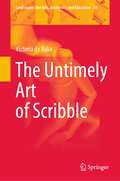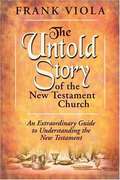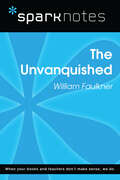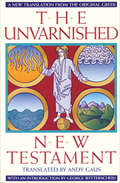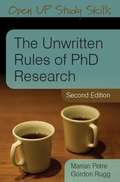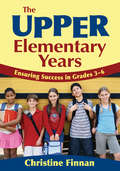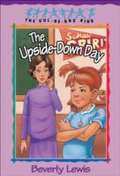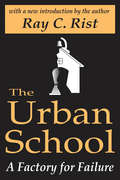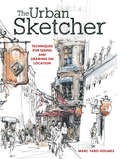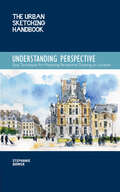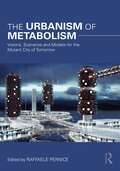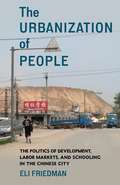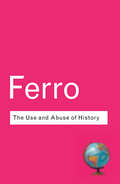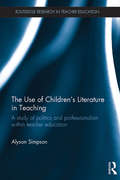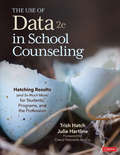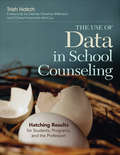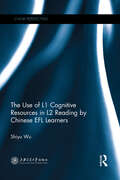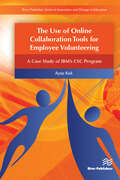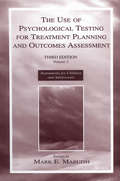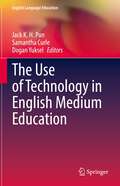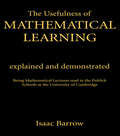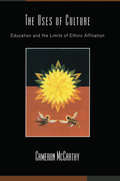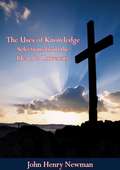- Table View
- List View
The Untimely Art of Scribble (Landscapes: the Arts, Aesthetics, and Education #34)
by Victoria de RijkeThis book offers new definitions, vocabularies and insights for “scribbling”, viewing it as a fascinating and revealing process shared by many different disciplines and practices. The book provides a fresh and timely perspective on the nature of mark making and the persistence of the gestural impulse from the earliest graphic marks to the most sophisticated artistic production. The typical treatment of scribbling in the literature of artistic development has cast the practice as a prelude to representation in drawing and writing, with only occasional acknowledgment of the continuing joy and experiment of making marks across many arts practices. The continuous line the author traces between the universal practice of scribbling in infancy and early childhood and the work of radical creativity for contemporary and historical artists is original and clarifying, expanding the range of drawing behaviors to that of avant-garde painters, performance and the digital.
The Untold Story of the New Testament Church: An Extraordinary Guide to Understanding the New Testament
by Frank ViolaA scholar of the New Testament Church and a forerunner of modern Church renewal, Frank Viola casts his gaze back at the birth pangs of first century Christianity in The Untold Story of the New Testament Church. Using a 'you-are-there' approach, this epic volume gives readers a first-hand account of how the witness of Christ's testimony impacted the world. In the era right after the Day of Pentecost, the power of Holy Spirit prompted a massive harvest of souls yet a great persecution surged against those preaching Good News to the lost. Now, get up-close with apostles Paul, Peter and John and learn of their personal struggles to fight for the faith amidst a backdrop of in-house strife and foreign tyranny.
The Unvanquished (SparkNotes Literature Guide Series)
by SparkNotesThe Unvanquished (SparkNotes Literature Guide) by William Faulkner Making the reading experience fun! Created by Harvard students for students everywhere, SparkNotes is a new breed of study guide: smarter, better, faster. Geared to what today's students need to know, SparkNotes provides: *Chapter-by-chapter analysis *Explanations of key themes, motifs, and symbols *A review quiz and essay topicsLively and accessible, these guides are perfect for late-night studying and writing papers
The Unvarnished New Testament: A New Translation from the Original Greek
by Andy GausAncient religious wisdom in a modern tongue—gives you a new perspective on the New Testament without having to learn another language. This new, innovative translation of the New Testament opens the closed doors of preconception and allows the reader to view these important Greek writings in an entirely different light. Based on a radical and startling premise, The Unvarnished New Testament asks, &“Why not present the New Testament simply as it appears in the original Greek?&” In these pages, you&’ll get all of the ancient nuances and original meanings, as if two thousand years of Christian history had not occurred. &“The books read wonderfully smoothly since there is no attempt at maintaining any semblance of formal translation. At the same time preserving the mysticism, philosophy and theology of the underlying Greek better than any bible I know of. He accomplishes exactly what dynamic translation aims for.&”—Church Discipline, &“10 Really Good Bibles You May Not Know About&” &“What Andy Gaus has achieved (and brilliantly achieved) in his new Translation is to present the ideas, words and context of the various books of the New Testament as they would have been perceived by a majority of educated Greek readers in the third and fourth centuries.&”—John Howard Reid, EzineArticles.com
The Unwritten Rules of PhD Research (Second Edition)
by Gordon Rugg Marian PetreThis book on the process of PhD research, provides readers with engaging discussion and comprehensive guidance on aspects covering all the key topics of the previous edition, including what a PhD is really about, how to do one well, how to decipher what your supervisor actually means by terms like 'good referencing' and 'clean research question' and how to design, report and defend your research, the authors continue to offer an accessible, down-to-earth, and insightful account of the whole PhD process..
The Upanishads Volume 2
by Joseph Campbell Swami NikhilanandaSwami Nikhilananda's English translation of three of the major Upanishads - Svetasvatara, Prasna, and Mandukya - offers a scholarly, yet readable version of the sacred texts of ancient India. The Upanishads form the foundation of the Hindu religion and describe the ultimate objective of life - the liberation of the soul from the bondage of the phenomenal world. Swami Nikhilananda's clear and insightful writing combined with notes and explanation based on the commentary of Sankaracharya, the great eighth-century philosopher and mystic of India, will help the spiritual seeker delve into the meaning of these spiritual treasures. This second of four volumes also contains an introduction with a general outline of Hindu ethics.
The Upper Elementary Years: Ensuring Success in Grades 3-6
by Dr Christine R. FinnanOffering a child-centered approach for teaching 8- to 12-year-olds, this detailed resource discusses child development, instruction and assessment, and professional growth and advocacy.
The Upside-Down Day
by Beverly LewisIt's school spirit day at Blossom Hill School, and even the students' new teacher, Miss Hershey, is joining the wacky fun. Yet when the new girl dares the Cul-de-sac Kids to guess her secret, they all try to uncover the mystery.
The Urban School: A Factory for Failure
by Christian KarnerAmericans worry continually about their schools with frequent discussions of the "crisis" in American education, of the "failures" of the public school systems, and of the inability of schools to meet the current challenges of contemporary life. Such concerns date back at least to the nineteenth century. A thread that weaves its way through the critiques of American elementary and secondary schools is that the educational system is not serving its children well, that more should be done to enhance achievement and higher performance. These critiques first began when the United States was industrializing and were later amplified when the Soviets and Japan were thought to be grinding down the competitive position of America. At the start of the twenty-first century, as we discuss globalization and maintaining our leadership position in the world economy, they are being heard again.The Urban School: A Factory for Failure challenges these assumptions about American education. Indeed, a basic premise of the book is that the American school system is working quite well-doing exactly what is expected of it. To wit, that the schools in the United States affirm, reflect, and reinforce the social inequalities that exist in the social structures of the society. Stated differently, the schools are not great engines for equalizing the existing social inequalities. Rather, they work to reinforce the social class differences that we have had in the past and continue to have in more pronounced ways at present.Rist uses both sociological and anthropological methods to examine life in one segregated African-American school in the mid-western United States. A classroom of some thirty children were followed from their first day of kindergarten through the second grade. Detailed accounts of the day-by-day process of sorting, stratifying, and separating the children by social class backgrounds demonstrates the means of ensuring that both the poor and middle-class students soon learned their appropriate place in the social hierarchy of the school. Instructional time, discipline, and teacher attention all varied by social class of the students, with those at the bottom of the ladder consistently receiving few positive rewards and many negative sanctions.When The Urban School was first published in 1973, the National School Boards Association called it one of the ten most influential books on American education for the year. It remains essential reading for educators, sociologists, and economists.
The Urban Sketcher: Techniques for Seeing and Drawing on Location
by Marc Taro HolmesMake the world your studio!Capture the bustle and beauty of life in your town.Experience life as only an artist can! Join the rapidly growing, international movement of artists united by a passion for drawing on location in the cities, towns and villages where they live and travel. Packed with art and advice from Marc Taro Holmes, artist and co-founder of Urbansketchers.org, this self-directed workshop shows you how to draw inspiration from real life and bring that same excitement into your sketchbook. Inside you'll fi nd everything you need to tackle subjects ranging from still lifes and architecture to people and busy street scenes.15 step-by-step demonstrations cover techniques for creating expressive drawings using pencil, pen and ink, and watercolor.Expert tips for achieving a balance of accuracy, spontaneity and speed.Practical advice for working in the field, choosing subjects, coping with onlookers, capturing people in motion and more.Daily exercises and creative prompts for everything from improving essential skills to diverse approaches, such as montages, storytelling portraits and one-page graphic novels.Whether you are a habitual doodler or a seasoned artist, The Urban Sketcher will have you out in the world sketching from the very first page. By completing drawings on the spot, in one session, you achieve a fresh impression of not just what you see, but also what it feels like to be there . . . visual life stories as only you can experience them.
The Urban Sketching Handbook: Easy Techniques for Mastering Perspective Drawing on Location (Urban Sketching Handbooks Ser. #4)
by Stephanie BowerA good sketch starts with good bones—this guide from an architectural illustrator shows how to think like an architect and master accurate perspective.This book in the Urban Sketching Handbook series uses drawings and simple steps to explain the often challenging and overwhelming concepts of perspective in practical and useful ways for on-site sketching. Most books are either too abstract or don’t provide enough information that relates to what you actually do when you’re out in the busy, wide world about to start a drawing. Where do you start? How do you edit what you see to flatten and shrink it onto your paper? How does perspective work?The Urban Sketching Handbook: Understanding Perspective helps you learn to think like an architect, to draw buildings and spaces by reducing what you see to simple, basic shapes, then adding layers in simple steps, and finally finishing your sketch with detail, tone, and color—in accurate perspective. Full of helpful tips, it even deconstructs sketches to show you how to create them! Once you understand perspective, it will change the way you see the world—you’ll see perspective everywhere. Key concepts explored in this volume include:Basic Terms * Basic Spatial Principles * Types of Perspective * Building a Sketch in Layers * Special Conditions
The Urbanism of Metabolism: Visions, Scenarios and Models for the Mutant City of Tomorrow
by Raffaele PerniceThis edited book explores and promotes reflection on how the lessons of Metabolism experience can inform current debate on city making and future practice in architectural design and urban planning. More than sixty years after the Metabolist manifesto was published, the author’s original contributions highlight the persistent links between present and past that can help to re-imagine new urban futures as well as the design of innovative intra-urban relationships and spaces. The essays are written by experienced scholars and renowned academics from Japan, Australia, Europe, South Korea and the United States and expose Metabolism’s special merits in promoting new urban models and evaluate the current legacy of its architectural projects and urban design lessons. They offer a critical, intellectual, and up-to-date account of the Metabolism projects and ideas with regard to the current evolution of architectural and urbanism discourse in a global context. The collection of cross-disciplinary contributions in this volume will be of great interest to architects, architectural and urban historians, as well as academics, scholars and students in built environment disciplines and Japanese cultural studies.
The Urbanization of People: The Politics of Development, Labor Markets, and Schooling in the Chinese City
by Eli FriedmanAmid a vast influx of rural migrants into urban areas, China has allowed cities wide latitude in providing education and other social services. While millions of people have been welcomed into the megacities as a source of cheap labor, local governments have used various tools to limit their access to full citizenship.The Urbanization of People reveals how cities in China have granted public goods to the privileged while condemning poor and working-class migrants to insecurity, constant mobility, and degraded educational opportunities. Using the school as a lens on urban life, Eli Friedman investigates how the state manages flows of people into the city. He demonstrates that urban governments are providing quality public education to those who need it least: school admissions for nonlocals heavily favor families with high levels of economic and cultural capital. Those deemed not useful are left to enroll their children in precarious resource-starved private schools that sometimes are subjected to forced demolition. Over time, these populations are shunted away to smaller locales with inferior public services.Based on extensive ethnographic research and hundreds of in-depth interviews, this interdisciplinary book details the policy framework that produces unequal outcomes as well as providing a fine-grained account of the life experiences of people drawn into the cities as workers but excluded as full citizens.
The Use and Abuse of History: Or How the Past is Taught to Children (Routledge Classics)
by Marc FerroUse and Abuse of History has become a key text of current historiography; this is a book that poses fundamental and disturbing questions about the use and abuse of history. Engaging and challenging, this book confronts the reader with the many 'histories' that exist and have existed around the world, from the Zulu kingdoms to Communist China. This title has now been extensively revised by Marc Ferro, a well respected historian, and presents the different narratives that constitute the histories of countries as diverse as India, Iran, Trinidad and the United States makes for fascinating reading in their own right. What makes this book so valuable, though, is what these narratives tell us about the societies which create them – how much is history distorted in order to condition the minds of those who are taught it? Use and Abuse of History appeals to anyone with a general interested in history.
The Use of Children's Literature in Teaching: A study of politics and professionalism within teacher education (Routledge Research in Teacher Education)
by Alyson SimpsonThe Use of Children's Literature in Teaching reveals the impact of politics, professional guidelines and restrictive measurements of literacy on the emerging identities of young teachers. It places renewed emphasis on the importance of creative teaching with children’s literature for the empowerment of teacher agency to enhance the learning of their students. Framing the debate alongside the issue of teacher autonomy, Simpson describes results from a two-year study, which brings together information from interviews, surveys, document analysis and digital stories from Australia, Canada, the UK and the US to assess the role of children’s literature in pre-service teacher education. Through cross-cultural comparison, this research captures the different levels of connection between politics, education systems, higher education and pre-service teachers. It exposes how politics, narrow views of professionalism and program structures in teacher education may adversely affect the development of pre-service teachers. This book presents a strong case that reading and responding critically to literary texts leads to better educational outcomes than basic decoding and low-level comprehension training. As such, this book will be of great interest to researchers and scholars working in the areas of teacher education and literacy and primary education. It should also be essential reading for teacher educators and policymakers.
The Use of Data in School Counseling: Hatching Results (and So Much More) for Students, Programs, and the Profession
by Trish Hatch Julie HartlineTurn random acts of school counseling into definitive and data-driven efforts! In this new edition of a bestseller, school counseling scholar and advocate Trish Hatch and National School Counselor of the Year Julie Hartline provide school counselors with new ways for moving from reactive to proactive and from random to intentional counseling. By using data to determine what all students deserve to receive and when some students need more, readers will learn effective ways to provide proactive school counseling services, hold themselves accountable, and advocate for systemic change. Inside you’ll find: Clear and straightforward directions for analyzing data, planning and providing interventions, and evaluating your work Strategies for using data to drive interventions, develop curriculum scope and sequence, create action plans and pre- and post-tests, initiate systems changes, and report results Methods aligned with the most recent edition of the ASCA National Model (2019), ASCA Professional Standards and Competencies, Evidence-Based Practice, Multi-Tiered Systems of Support (MTSS), and Multi-Tiered Multi-Domain Systems of Support (MTMDSS) New practitioner examples and artifacts, including a RAMP School of Distinction Flashlight Package, plus dozens of tools, templates, surveys, action plans, and data management forms Equip yourself to think and plan differently, and become more efficient and effective by using data to drive your school counseling program!
The Use of Data in School Counseling: Hatching Results (and So Much More) for Students, Programs, and the Profession
by Trish Hatch Julie HartlineTurn random acts of school counseling into definitive and data-driven efforts! In this new edition of a bestseller, school counseling scholar and advocate Trish Hatch and National School Counselor of the Year Julie Hartline provide school counselors with new ways for moving from reactive to proactive and from random to intentional counseling. By using data to determine what all students deserve to receive and when some students need more, readers will learn effective ways to provide proactive school counseling services, hold themselves accountable, and advocate for systemic change. Inside you’ll find: Clear and straightforward directions for analyzing data, planning and providing interventions, and evaluating your work Strategies for using data to drive interventions, develop curriculum scope and sequence, create action plans and pre- and post-tests, initiate systems changes, and report results Methods aligned with the most recent edition of the ASCA National Model (2019), ASCA Professional Standards and Competencies, Evidence-Based Practice, Multi-Tiered Systems of Support (MTSS), and Multi-Tiered Multi-Domain Systems of Support (MTMDSS) New practitioner examples and artifacts, including a RAMP School of Distinction Flashlight Package, plus dozens of tools, templates, surveys, action plans, and data management forms Equip yourself to think and plan differently, and become more efficient and effective by using data to drive your school counseling program!
The Use of Data in School Counseling: Hatching Results for Students, Programs, and the Profession
by Trish HatchReach ALL students and prove how critical your counseling program is! Data can make the difference for today’s embattled school counseling programs, and this insightful book shows how to collect and manage it. Aligned with current research and the ASCA standards, this essential resource includes a complete set of user-friendly tools and templates for data collection, action-planning and reporting. Readers will learn how to: Develop a robust counseling curriculum that supports the Common Core Standards and drop-out prevention Replace “random acts of guidance” with intentional, well-timed interventions that are based on student needs Measure progress through pre- and post-assessments Deliver compelling reports that demonstrate your program’s impact
The Use of L1 Cognitive Resources in L2 Reading by Chinese EFL Learners (China Perspectives)
by Shiyu WuThis book focuses on the effects of L1 cognitive resources on L2 reading e.g. the effects of L1 reading ability, the ability in L1 mental-structure building, L1 cognitive use in L2 reading, and other related cognitive mechanisms and capacities of EFL learners in China. It integrated test-based and product-oriented as well as VPA-based (verbal protocol analysis) and process-oriented experiments to address the problems of reading in a second language. This book provides several theoretical, methodological and pedagogical insights, including the multidimensional nature of L2 reading and Vygotskyan sociocultural theory as a suitable L2 reading framework, combined approaches on L2 studies, and the rewarding active use of L1 cognitive resources in L2 learning.
The Use of Online Collaboration Tools for Employee Volunteering
by Ayse KokThe digital age has introduced a deeper sense of connectivity in business environments. By relying more heavily on current technologies, organizations now experience more effective communication and opportunities for collaboration between individuals.The Use of Online Collaboration Tools for Employee Volunteering is one of the latest scholarly research works on the design and implementation of e-collaboration technology in a workplace setting. Featuring extensive coverage on a range of topics relating to the benefits and challenges of these tools, this book is an essential reference source for students, researchers, and practitioners seeking relevant research on the use of digital spaces within organizational contexts. Technical topics discussed in the book include: .• Communities of Practice (CoP)• E-Collaborative Learning• Computer-supported collaborative learning• Social Networking Sites• Web-Based Learning
The Use of Psychological Testing for Treatment Planning and Outcomes Assessment: Volume 2: Instruments for Children and Adolescents
by Mark E. MaruishTest-based psychological assessment has been significantly affected by the health care revolution in the United States during the past two decades. Despite new limitations on psychological services across the board and psychological testing in particular, it continues to offer a rapid and efficient method of identifying problems, planning and monitoring a course of treatment, and assessing the outcomes of interventions.This thoroughly revised and greatly expanded third edition of a classic reference, now three volumes, constitutes an invaluable resource for practitioners who in a managed care era need to focus their testing not on the general goals of personality assessment, symptom identification, and diagnosis so often presented to them as students and trainees, but on specific questions: What course of treatment should this person receive? How is it going? Was it effective? New chapters describe new tests and models and new concerns such as ethical aspects of outcomes assessment. Volume I reviews general issues and recommendations concerning the use of psychological testing for screening for psychological disturbances, planning and monitoring appropriate interventions, and the assessing outcomes, and offers specific guidelines for selecting instruments. It also considers more specific issues such as the analysis of group and individual patient data, the selection and implementation of outcomes instrumentation, and the ethics of gathering and using outcomes data. Volume II discusses psychological measures developed for use with younger children and adolescents that can be used for the purposes outlined in Volume I; Volume III, those developed for use with adults.Drawing on the knowledge and experience of a diverse group of leading experts--test developers, researchers, clinicians and others, the third edition of The Use of Psychological Testing for Treatment Planning and Outcomes Assessment provides vital assistance to all clinicians, and to their trainees and graduate students.
The Use of Technology in English Medium Education (English Language Education #27)
by Jack K. H. Pun Samantha Curle Dogan YukselThis volume discusses how the use of technology creates opportunities for effective teaching practice and illustrates ways to apply innovative and stimulating ways to engage and interact with students on-line. This research-led book brings together teaching practice and case studies and provides a comprehensive understanding of how technology can enhance teaching and learning through English as medium of instruction. It helps to further the understanding of challenges that language teachers and learners may experience, and provides suggested solutions to address these challenges. It also reflects on the use of technology trough case studies and practical tasks. This book brings theory and practice together and it informs research and classroom practices. It will therefore be of great value to teachers in training as well as to those already working or researching in the field.
The Usefullness of Mathematical Learning: Explained and Demonstrated
by Isaac BarrowThis is a collection of mathematical lectures that were read in the Publick Schools at the University of Cambridge and was originally published in 1734. It includes twenty-three lectures which range in topic from the name and general division of mathematical sciences, to An answer to Borellus' Objections.
The Uses of Culture: Education and the Limits of Ethnic Affiliation (Critical Social Thought)
by Cameron McCarthyFirst Published in 1998. Routledge is an imprint of Taylor & Francis, an informa company.
The Uses of Knowledge Selections from the Idea of a University
by John Henry NewmanThis insightful selection, features four discourses from The Idea of a University: Knowledge Its Own End; Knowledge Viewed in Relation to Learning; Knowledge Viewed in Relation to Professional Skill; and Knowledge Viewed in Relation to Religion. Also included are excerpts from the "Preface" and the following appendices: Discipline of Mind; Literature and Science; and Style. Edited by Leo L. Ward, this volume also contains an introduction, a list of principal dates in Newman's life, and a bibliography.
